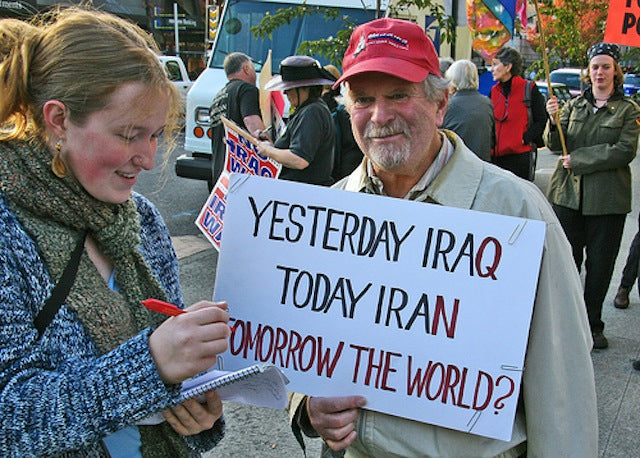Seumas Milne: The End of the New World Order as We Know It


[T]he ministers involved in the Blair government were terrified of the demonstration. They were terrified of the strength of public opinion.The first twelve years of the 21st century have been eventful ones. Beginning with the biggest terrorist attack on American soil, it has since followed with an increasingly drawn out illegal war, uprising in the Arab world, the biggest global financial crisis since the Wall Street Crash in the 1930s and a global backlash to the stranglehold of neoliberal economics. The New World Order that began with the election of George H.W. Bush is under threat.
Slavoj Žižek singled out 2011 as the Year of Dreaming Dangerously but Seumas Milne's new book The Revenge of History points to the first decade of 21st century, and more accurately the summer of 2008 as the "watershed" moment of the decline of the New World Order. Until this time, socialism was a concept resigned to the end of the Cold War, an 80s throwback that was not due to make a return any time soon. Global capitalism had lead the way. Neoliberal economics. Free markets. Western dominance.
Seumas Milne, the Guardian columnist, has compiled his writing from over the last decade into this collection, an amalgam that revisits the decade with a new perspective, one that was widely disagreed with at the time. Interviewed by Joe Kennedy in the Quietus, he recalls how Michael Gove referred to the collective opinion on this renegade group of journalists as the 'Prada-Meinhof' group: "It just drove home to me how everything the establishment – politicians, the mainstream media – had said proved to be utterly wrong, and everything we had said had turned out to be correct."
In an extract of the book published recently in the Guardian, Milne outlines the factors that brought about this turn in world history as by "the end of a decade of continuous warfare, the US had succeeded in exposing the limits, rather than the extent, of its military power."
A voracious model of capitalism forced down the throats of the world as the only way to run a modern economy, at a cost of ballooning inequality and environmental degradation, had been discredited – and only rescued from collapse by the greatest state intervention in history. The baleful twins of neoconservatism and neoliberalism had been tried and tested to destruction.Milne argues that the global opinion in the wake the fall of the Soviet Union did not foretell a "feral capitalism", but that the states within the union would devolve in different ways. After the threat of the Soviets had dissipated, there was a confused scurrying as to who the next global threat would be.
If the first ten years of the 2000s passed without realising we were living through a decade of immeasurable change, what next for the years ahead? Milne feels that public attitude in the years of the Iraq War was that demonstration does not work. People protested in their millions and still the war went ahead. But he does not believe that a single march should be considered as the only attempt to bring change. The present-past has given evidence of that. If the future cannot be mapped for lack of direction, the way forward may continue with the belief that there exists an actual force of change:
There are things happening in the world which I think people should focus on to show that it’s not just rhetoric. To some extent that’s also happened in the uprisings in the Arab world, although again there’s contradictions about that - but these four or five fundamental shifts in the world have transformed it. We’re in a new world which is being born now.
Visit the Guardian and the Quietus to read the articles in full.
